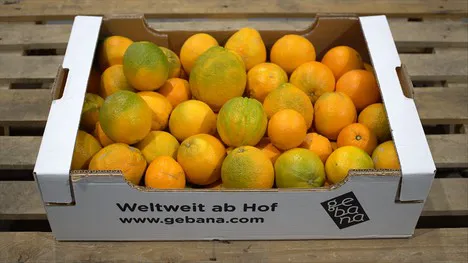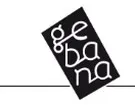Juicy-sweet tasting oranges can vary quite a lot on the outside - some still being green, some scarred, others small like clementines or as large as grapefruits. However, the consumer will not find these unique oranges in stores. That's because there is an EU regulation that dictates exactly how citrus fruits must look when being sold. Since the 2020 orange season, Swiss fair trade pioneer gebana has been defying this law for oranges and bringing the so-called 'real oranges' to private customers' homes in all the colors, shapes and sizes that nature has to offer.
"Consumers are delighted and Greek farming families can export over 90 percent of their harvest. Through the gebana model, the Greek farmers also participate directly in gebana's sales. Thus, in addition to the regular organic and fair price, at the end of each season the farming families receive 10 percent of the money gebana earns from the sale of the citrus fruits. From the beginning of September 2022, the oranges, which are imperfect on the outside but perfect on the inside, can also be pre-ordered in Germany via gebana's online store," the company reports.

There is an EU regulation that specifies what citrus fruits must look like for sale to the consumer: orange, intact, free of bruises or severe scars, preferably no size differences within a box, and at least 53 millimeters in diameter. Smaller or unique oranges may only be processed into juice.
Gebana comments: "However, this regulation is made for supermarkets, where all products are sold in a standardized way. The losers are customers, farming families and the environment. In the past, the farming families with whom gebana works had to sort out up to 35 percent of their harvest because it did not meet the standard. These genuine oranges can now only be sold on the local market or to the juice industry, from which they receive a fraction of the price for table oranges. The losses are enormous."
Unique business model in the fight against food waste
In 2019, gebana decided to do something about this waste and applied for a derogation from the EU. The advised gebana to simply label the oranges "Intended for processing." The export rules would then no longer apply. gebana brought real oranges into the EU for the first time in the 2020/21 season thanks to this notice. Some were still green, some scarred, others small like clementines or as big as grapefruits. "Our customers were thrilled. In the very first year of real oranges, they flooded us with pictures of their deliveries, posting them on Instagram, Facebook and Twitter," says Adrian Wiedmer, former CEO of gebana and Chairman of the Board of Directors since September 2022, delighted with the success.
Thanks to online trading, the oranges can be shipped directly from Greece when they are really ripe and arrive fresh at the customer's door. Like all gebana products, the oranges are sold in large packs (13 kg crates). This reduces waste, shortens transport distances and is particularly efficient.

Greek producers benefit from gebana model
gebana works with 93 farming families in Greece. In the first season of 'real oranges' 2020/2021, the farming families were able to export 91.5 percent of their harvest as table oranges for the first time. In the 2018/19 season, which was very similar in terms of quality and quantity harvested per field, families were only able to sell around 82 percent of their crop to gebana for export. The relative crop loss was therefore halved and the farming families earned significantly more than in previous years.
"Thanks to participation in the gebana model, farmers get a direct share of gebana's sales. In the case of Greece, this means that in addition to the regular organic and fair price, at the end of each season the families receive 10 percent of the money gebana earns from the sale of the citrus fruits."

For more information:
Gebana AG
Sandra Dütschler
Tel.: +41 433 66 65 06
s.duetschler@gebana.com
www.gebana.com
